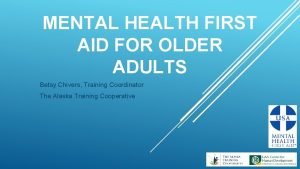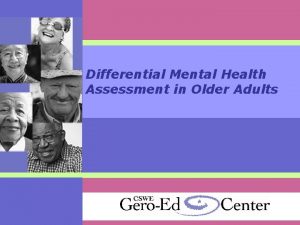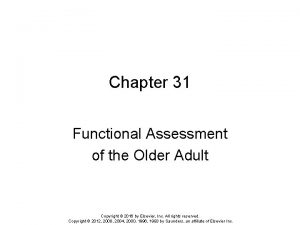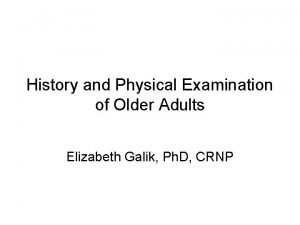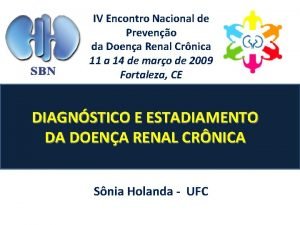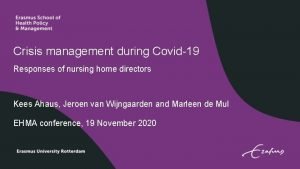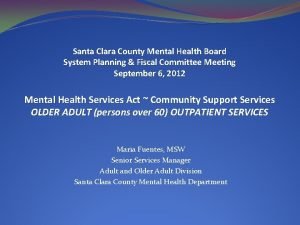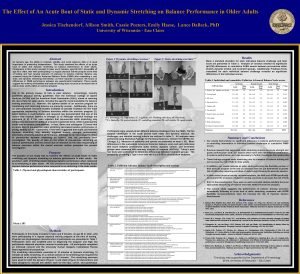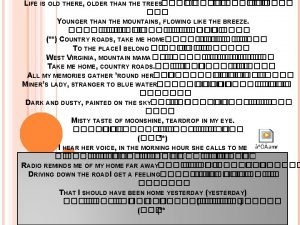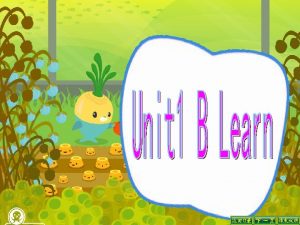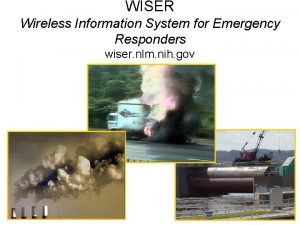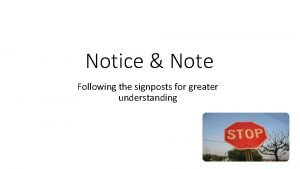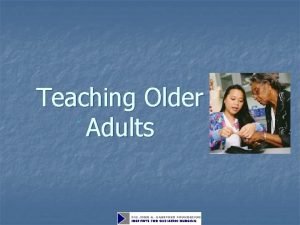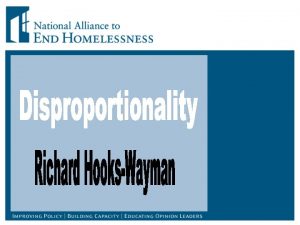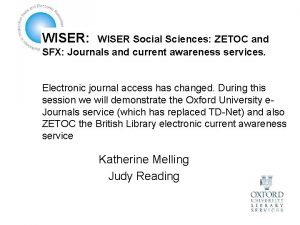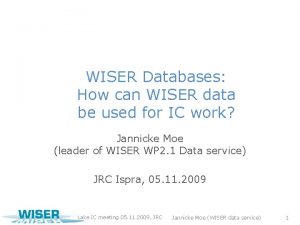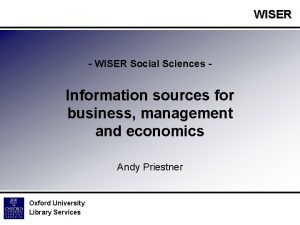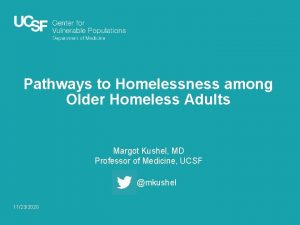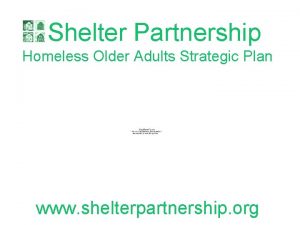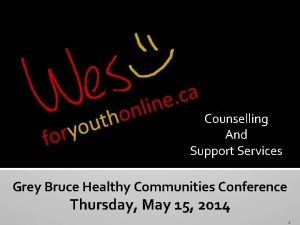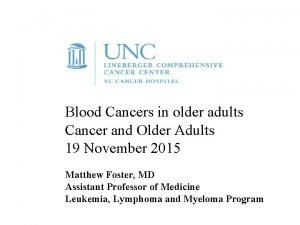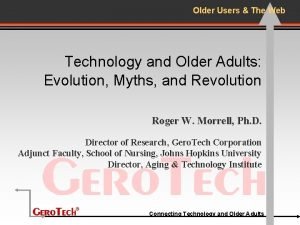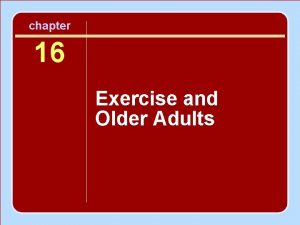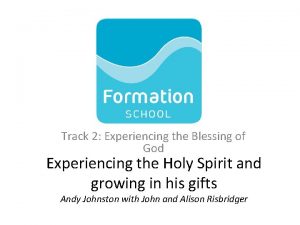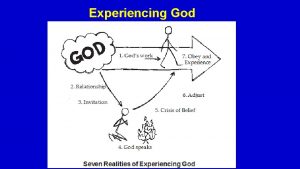Older wiser and homeless Counselling older adults experiencing


















- Slides: 18

Older, wiser … and homeless Counselling older adults experiencing homelessness Emerging priorities in mental health and addictions: the virtual world, ageing and migration 3 rd June 2016, University of St. Andrews Presented by Derek Dempsey Andrea Koenigstorfer

Agenda • • • Introduction to the Dublin Simon Community Context to our research Presenting issues Barriers to treatment Our focus with this client group Questions

About Dublin Simon Community The Simon Communities in Ireland is an affiliation of local Communities in Cork, Dublin, Dundalk, Galway, the Midlands, the South East, the North West and the Mid West. The Simon Community across the country provide support and services to over 7500 individuals and families experiencing or at risk of homelessness every year. Together, with people who are homeless, Simon tackles the root causes, promotes innovative responses and urges the government to fulfil their commitments.

Our services for all stages Emergency & Outreach ØRough Sleeper Team (Regional Contact & Outreach Service) ØSoup Run ØSocial Club ØNeedle Exchange Programme ØEmergency Shelter (Supported Temporary Accommodation) Housing Services ØHigh Support Housing ØMedium Support Housing Treatment & Recovery ØStabilisation/Respite Unit ØDetox Service Ø Rehabilitation Service Ø Aftercare Services ØCounselling Service Preventing Homelessness ØSupport to Live Independently ØVisiting Tenancy Support ØTenancy Advice Service ØWicklow, Kildare & Meath Support Services Personal Development ØLearning & Development ØClient Involvement ØHealth & Wellbeing

Our Mission: Empower people to access and retain a home, by providing housing, prevention and targeted interventions through advocacy and partnership. First ever Soup Run in 1969. Provide services to people who are homeless or at risk of homelessness, from emergency accommodation to treatment and supported housing, enabling people to move to a place they can call home. Today Dublin Simon Community over 24 services across Dublin, Kildare, Wicklow and Meath. We work with over 217 part-time and 53 full-time volunteers. Approximately 210 full-time and part-time staff.

Homelessness Dublin Simon work with over 3, 000 people a year in Dublin, Kildare, Wicklow and Meath Ø There are now over 4, 300 people in temporary emergency accommodation nightly across the greater Dublin region Ø Currently there are over 790 families with 1, 616 children living in emergency accommodation in the greater Dublin region. This is an increase of 110% since this time last year Ø NATIONALLY: 5, 811 people in emergency accommodation; 2, 706 adults with no dependents and 912 families made up of 1, 224 adults with 1, 881 children. 49% increase nationally since the same week in February 2015 and 1. 6% from January 2016.

Context • Higher prevalence of Mental Health issues among older homeless adults compared to their younger counterparts • More complex issues compared to general population – alcohol & substance use, past trauma, isolation from family, limited opportunities • Complications in assessment of MH issues are considered a part of ageing

Presenting issues – general population • Losses & loneliness, bereavement, survivor guilt • Lack of interaction with others • Health problems, disabilities • Dementia • Loss of independence – wish to be cared for vs needing to be in control of their life

Presenting issues – specific to older homeless adults • Past trauma – Impact on sense of self, sense of safety and control, ability to self-regulate, and interpersonal relationships • Failing health, disability • Reduced social engagement • Alcohol and substance use • Lack of financial resources, life skills, and social support • Safety – living without a stable home can be particularly challenging in later life/violence in shelters and on the streets

This leads to: • • Depression Feelings of inadequacy, worthlessness, shame Fear Vulnerability Anger Fear of abandonment Helplessness

Issues in accessing traditional Counselling Services – general population • • Mobility Faltering concentration/memory issues Hearing problems Physical illness Lack of understanding of what counselling is Difficulties sharing problems with a stranger Issues “not suitable” for counselling Frequently focus on pharmacological treatment and “encouragement” to “go out and socialise more”

Issues in accessing traditional Counselling Services – older homeless adults • History of trauma and psychological issues linked with homelessness Ø Multifaceted needs require access to specialised services not available in shelters

Treatment – age specific issues Deal with negative emotions Come to terms with loss Meaning-making Clients provide a narrative of their lives – the role they played in it – find new meaning/purpose in life – acceptance and ability to live in the present • Stress independence – don’t let them become infantilised (shelters!) • Maintain self-esteem – support and build on coping strategies • Stress and build on their resilience • •

Our focus with this client group • Incorporate an understanding of trauma into our work – Build physical and emotional safety – Emphasise importance of choice – Rebuild self-efficacy and control over their lives • Focus on strengths rather than deficits • Understand drivers

Meet the client where they’re at and go where they need to go • Be open and non-judgemental • Provide the service where they are – shelters, supported housing, mobile health clinic, treatment services • Drop-in clinics to provide information • Reminders for appointments • Adapt session length to client’s physical and mental capacity on a particular day

LISTEN – VALIDATE – BUILD A RELATIONSHIP OF TRUST FIND VALUE IN WHAT WE ARE DOING SUCCESS MIGHT NOT COME IN HUGE LEAPS AND BOUNDS “PLANTING A SEED”

QUESTIONS?

The presenters have no conflict of interest to declare.
 Mental health and older adults
Mental health and older adults Mental health and older adults
Mental health and older adults Altered cognition in older adults is commonly attributed to
Altered cognition in older adults is commonly attributed to Shingles older adults
Shingles older adults Renal
Renal Covids older adults
Covids older adults Older adults mental health
Older adults mental health Dynamic stretching for older adults
Dynamic stretching for older adults Life is older than the trees
Life is older than the trees Taller younger shorter older
Taller younger shorter older Wireless information system for emergency responders
Wireless information system for emergency responders Of mice and men signposts
Of mice and men signposts Words of the wiser signpost
Words of the wiser signpost Copy the words
Copy the words What does words of the wiser mean
What does words of the wiser mean Angela wiser
Angela wiser Wiser dissertation
Wiser dissertation Wiser kings
Wiser kings A fall in a ditch makes you wiser meaning
A fall in a ditch makes you wiser meaning
